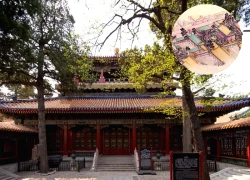Suez Canal - The Great Dream of the Pharaohs

5 | 0 Discuss | Share
Ethiopia is a beautiful country blessed with a rich history along with amazing wildlife and greenery. As a country that has never been colonized, the ethnic cultural identity is still retained by the people today. Most people only know Ethiopia as the most beautiful country in Africa, but there are many other interesting things about this country that not everyone knows.
13th month and 12 hour clock
The fact that a year has 12 months seems to have become an "unwritten law" of many countries around the world, including Ethiopia. Thousands of years ago, Ethiopians believed that having an extra month would bring more luck, and that's why they adhered to the 13 January calendar year throughout history. The Ethiopian calendar has 13 months, each month has 30 days. Particularly, the 13th month will only have 5 to 6 days. This means that, when the whole world welcomes 2017, it is 2019 in Ethiopia.
What is more special is that in Ethiopia there are only 12 hours a day, the time of sunrise will be the first hour and sunset will be counted as 12, then the clock will continue to count 12 hours from the beginning to the next day. after. The strange way of calculating the time of the people here has both intrigued visitors, but can cause confusion for those who come to visit.
The land of festivals
With over 100 million inhabitants, Ethiopia is the second most populous country in Africa. Located at a crossroads between the civilizations of North Africa, the Middle East and Sub-Saharan Africa.
Unique among African countries, Ethiopia was not colonized, maintaining its independence throughout Africa's colonial era onward, except in the period 1936-1941 when The country was under Italian military occupation.
Until now, when it comes to this country, many people will still think of the image of a politically unstable country, poor and underdeveloped people.
But Ethiopians love festivals, which may be why vibrant and colorful festivals are held all over the country year-round. In particular, the biggest festival, Timkat (also known as Timqat), is an annual festival held for 3 days from January 18 to 20 to commemorate the baptism of Jesus Christ on the Jordan River. During these days, thousands of people dressed in traditional white robes will participate in spiritual ceremonies performed by priests wearing colorful sacrificial robes and holding embroidered velvet umbrellas. The priest will pray all night and perform the ceremony, while the people will attend the ceremony, camp at the festival area and enjoy typical dishes such as bread, lamb under the bright torch.
Cradle of mankind
In 1974, archaeologist Donald Johanson found a 3.2 million-year-old skeleton called Lucy in the Awash valley in northern Ethiopia, initially confirming this to be the ancestor of humans. In 2008, a team of paleontologists reported that 4-million-year-old fossils had been found in the desert of Ethiopia. The remains found in the Afar region of northeastern Ethiopia belong to the Australopithecus families - a division of the Australopithecus race believed to be the direct ancestors of humans, according to a report published in the British Journal of very prestigious Nature. Thanks to this result, Natural magazine has honored Ethiopia as "the cradle of mankind", because this is the only place in the world where all three stages of human evolution have been found and documented.
The origin of coffee cups
On the world coffee map, it is impossible not to mention Ethiopia, where the first coffee cups were born. According to an Ethiopian folk tale, there was a goat herder named Kaldi from Abyssinia (the old name of Ethiopia) while herding goats, he discovered a red fruit, when he ate it, he suddenly felt strangely awake. Suspecting a miracle, he brought this fruit to visit a nearby monk, but was later thrown into the fire for fear that it was a forbidden fruit. Strangely, the red fruit when scorched has an unusual aroma, like a gift from God. The goat herder and the priest collected it, pounded it with water, and shared it with everyone. And that's when the world's first cup of coffee was born.
Coffee trees in Ethiopia have become part of the culture and beliefs of this country. Every morning, the woman in the family roasts fresh coffee in a clay pot along with aromas. The coffee beans are roasted, finely ground and carefully filtered and then put into a traditional Jebena earthenware pot to boil on the stove. The coffee is then served three times in the morning, noon, and evening, each time lasting up to 2-3 hours. Therefore, being invited to a cup of "home-made" coffee in Ethiopia can be considered an honor for any guest.
Magnificent 8 world cultural and natural heritage sites
Legend has it that God built the Garden of Eden, located somewhere near the Ghion River, which is the Blue Nile of Ethiopia now. Ethiopia is endowed with many wonderful natural wonders, including 8 UNESCO World Heritage sites, notably 11 monolithic churches during the reign of King Lalibela, and a castle complex. Fassil Ghebbi
In addition, the ancient city of Aksum is also a well-known landmark with very unique monument and tomb structures. Awas River Valley National Park is famous for its beautiful natural scenery, many waterfalls, rivers and streams, rich flora and fauna. Simien National Park attracts with its magical scenery mixed with smog and snow, it is home to rare animals in the world.
If you are a vegetarian, come to this country
According to Intrepid Travel, Ethiopian cuisine is considered very healthy, diverse and healthy. Unlike many other African countries, this can be considered a vegetarian's paradise. The simple reason for this unique culture is that most Ethiopians are religious and are required not to eat any animal products every Wednesday and Friday. Perhaps that's why the Ethiopians cook very ingenious vegetarian dishes, in which the famous dish "injera" with stewed vegetables is served with flat bread.
Visitors bring good things
Ethiopians are very hospitable. They believe that visiting the house is synonymous with bringing good things from heaven and earth. They will always give the warmest treatment to anyone who visits. And if a guest refuses the food or isn't excited about the items, the host will fear and feel guilty that the guest doesn't like their food.
Different conception of beauty
The Surma people of Ethiopia are famous for their custom of inserting plates into their lips. This is considered a symbol of beauty and social class for women in the tribe. The Surma people have two tribes, Suri and Mursi, living scattered along the Omo River in southwestern Ethiopia.
Women often cut their lips to place plates and create scars according to special patterns on the skin, then make up with white clay and fresh flowers. This custom is usually performed when a woman reaches marriageable age. Accordingly, they will break the two bottom teeth, then punch a hole in the lower lip and insert a small wooden knot. This wooden button is gradually replaced by a larger button, until the hole is large enough to insert a ceramic or wooden plate.
Abundant hydroelectric potential
Africa's vast hydroelectric resources have long been acknowledged but are still relatively untapped. Ethiopia has the second largest hydroelectric potential in Africa, with more than 80% of its water coming from the rivers of the Nile. With the 27th largest area in the world, Ethiopia has more than half of its territory stretching on the Ethiopian plateau. Here, many rivers and deep gorges cut through, creating a fault in topography. That fault also created many lakes, giving this place a very special climate sub-region.
However, the unstable political situation and uneven investment situation are still hindering the development of hydropower projects in the country. Sadly, only about a quarter of Ethiopia's population has access to electricity, according to World Bank statistics. In recent years, the Ethiopian government has adopted many economic development policies to create job conditions and improve people's living standards.
Phan Nhu Thao "cursed" the ex-wife of giant Duc An, revealing many times of being harmed  team youtuber15:00:03 04/05/2021Since marrying the giant Duc An, Phan Nhu Thao has repeatedly been tired of her husband's ex-wife - former supermodel Ngoc Thuy. Many years have passed, but the war of words on social networks and the lawsuit of the husband and wife Duc An and Ngoc Thuy has not stopped...
team youtuber15:00:03 04/05/2021Since marrying the giant Duc An, Phan Nhu Thao has repeatedly been tired of her husband's ex-wife - former supermodel Ngoc Thuy. Many years have passed, but the war of words on social networks and the lawsuit of the husband and wife Duc An and Ngoc Thuy has not stopped...

5 | 0 Discuss | Share

3 | 0 Discuss | Share

3 | 0 Discuss | Share

5 | 0 Discuss | Share

3 | 0 Discuss | Share

3 | 0 Discuss | Share

2 | 0 Discuss | Share

4 | 0 Discuss | Share

3 | 0 Discuss | Share

5 | 0 Discuss | Share

5 | 0 Discuss | Share

3 | 0 Discuss | Share






4 | 0 Discuss | Report